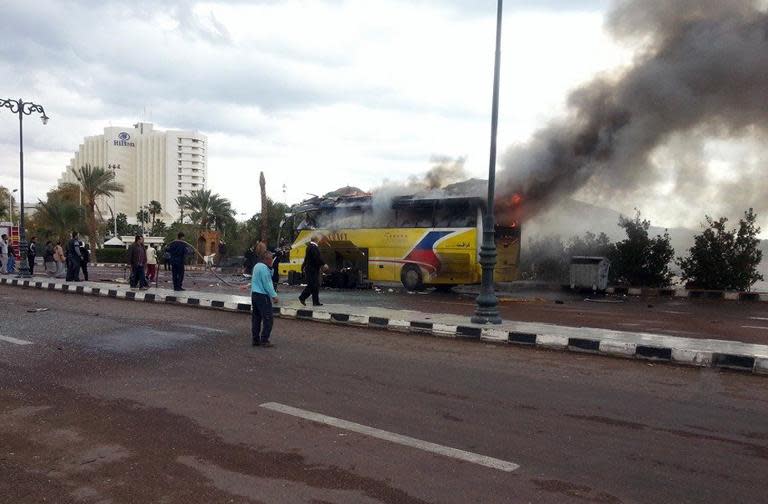Suicide bomber likely behind tourist attack: Egypt police
Egyptian police said Monday a suicide bomber was likely behind an attack on a tour bus that killed three South Koreans and signalled a possible change in tactics by militants who have mainly targeted security forces. The bombing on Sunday, near the Taba border crossing with Israel, was the first targeting tourists since the military overthrow of Islamist president Mohamed Morsi in July sparked a militant campaign that has killed scores of police and soldiers. A shift to 'soft targets' such as tourists would further damage Egypt's foundering tourism industry as army chief Abdel Fattah al-Sisi is expected to announce a presidential bid which would focus on law-and-order and economic recovery. After reviewing CCTV footage of the attack, police said they believe a suicide bomber boarded the tourist bus and detonated explosives near the door. "The preliminary investigation shows some tourists disembarked to get their bags. A man walked to the bus. There was an explosion when he reached the third step," interior ministry spokesman Hany Abdel Latif told AFP. The tourists were all members of the same church group from the central South Korean county of Jincheon and were on a 12-day trip through Turkey, Egypt and Israel. They were about to cross into Israel when the attack occurred. The South Korean ambassador to Egypt, Kim Young-So, told Seoul's MBN TV station that the bus bombing appeared to be a "suicide bombing by a terrorist." The Al-Qaeda inspired Ansar Beit al-Maqdis group, based in the Sinai Peninsula, has deployed several suicide bombers in attacks on police, as well as in a failed attempt to assassinate interior minister Mohamed Ibrahim in September. The military has sent tanks and troops to combat the militants. It said in a statement that five extremists were killed in army operations in northern Sinai on Monday. Islamist militants have killed dozens of tourists in sporadic attacks over the past several decades, most recently in a 2009 bombing that killed a French tourist in Cairo. - Militants regroup - Police under now deposed president Hosni Mubarak had all but stamped out Islamist militancy after a spate of Sinai resort bombings between 2004 and 2006. But the three-year period of unrest after Mubarak's overthrow in 2011 has allowed the militants to regroup in the restive Sinai peninsula and to branch out to the Nile Delta. "A continuation in attacks on tourists would mean a shift in strategy by jihadist groups that until now targeted the military and police," said Issandr El Amrani of the International Crisis Group. "But that cannot be judged after one attack," he added. The head of Egypt's Chamber of Tourism said the attack could have been aimed at hitting the tourism industry, one of Egypt's top revenue generators. "The attack aimed at harming tourism in general," said Elhami al-Zayat. Sunday's bombing came as a court in Cairo began trying Morsi and 35 co-defendants on charges of espionage and collusion with militants to launch attacks in Egypt. Morsi, Egypt's first democratically elected and civilian president, was ousted after a year in power amid massive protests demanding his resignation. The military-installed government has since accused Morsi's Muslim Brotherhood of masterminding the attacks that have also targeted police headquarters in Cairo. The Brotherhood, now designated as a terrorist group, publicly renounced violence decades ago and denies involvement in the attacks. The deadliest attacks have been claimed by the Sinai-based Ansar Beit al-Maqdis group, whose leadership is drawn from militant Bedouin who want an Islamist state in the peninsula.




